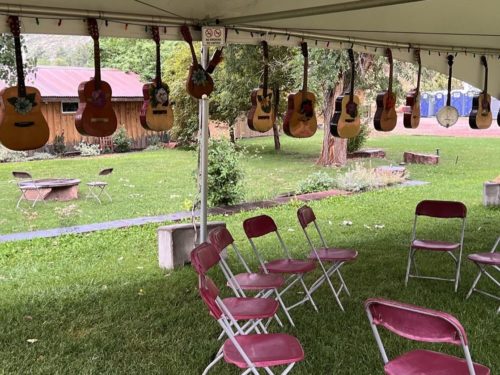
A story about wealth, philanthropy and the inner life
The start of a new adventure
Once upon time a gardener wanted to turn their scraggly yard into a beautiful ecosystem.
This created much excitement among the neighborhood pollinators, plants, worms, and soil. Everybody wanted the garden. Everyone knew they had a role to play in making the garden happen. The gardener was welcomed and celebrated.
“What an exciting new adventure we’re going to have!” said the plants.
“We’ll learn and grow together!” said the worms.
“This is going to be great,” said the soil.
Everyone was happy to get to work.
So the gardener created a garden design, tilled the soil, placed the plants, made them cozy with mulch, and watered them faithfully.
Rocky terrain
Pretty soon they heard some complaints.
- The worms didn’t like the way the soil had been tilled up.
- The plants wanted to be rearranged.
- The pollinators wished for more plants they liked.
- Even the gardener’s parents, who gave them the gardening tools as a gift, complained. “You know, if it were us, here’s how we’d do it.”
The gardener felt hurt.
They thought to themselves, “Hey I’m just trying to grow a garden here! How about a little support? Why is this so hard? Why don’t people get it?”

Trying to make things right
Deep inside, the gardener thought they had let the others down. Maybe they weren’t good enough to be a gardener. They felt like an imposter. They hated feeling this way and tried everything they knew to make it go away.
First the gardener tried to address all the complaints and fix all the problems. When that didn’t work, they tried to explain the logic of the garden, so everyone could see it was a good idea. Then they negotiated and tried to find compromise. They tried encouraging everyone to celebrate the garden, even if it wasn’t perfect.
Sometimes they got angry and said, “be glad there’s a garden at all!”
Meanwhile, the worms complained to the gardener about the pollinators (they were jealous of the pollinators’ pretty colors). The pollinators complained about the plants, which didn’t always flower. The plants complained about the soil because it wasn’t rich with humus yet. The parents complained about the lot and suggested the gardener move.
This became stressful. Soon, the gardener started to avoid the garden. They gardened at night so no one would see them. They paid people to garden for them. They went on vacation and remodeled their house.
They still felt disappointed and hurt. The hurt had turned into self-doubt and anxiety, which multiplied into things like bitterness, pessimism, and sadness.
Taking control
Finally, desperately wanting to succeed, the gardener decided to take control. They sprayed the garden everyday with synthetic fertilizer. Suddenly, the plants grew fast and colorful.
“Look at THAT,” thought the gardener with a satisfied smile.
But the plants became worried because the soil seemed to be dying. The worms left because the fertilizer wasn’t good for them. The pollinators were happy to have healthy plants, but were concerned the gardener would move and the fertilizer would stop flowing.
They all knew the gardener was unhappy. They were afraid they let the gardener down. They felt disappointed, anxious, and pessimistic too.
They worried the gardener would leave. So they always smiled and told the gardener how great things were going. They stopped talking to the gardener about what worked and what didn’t. They stopped cooperating and focused on themselves.
Facing a tough truth
One day, the gardener realized no one else was contributing to the garden. The plants wilted if the gardener didn’t fertilize. The soil wasn’t strong enough to keep the plants healthy. The pollinators left whenever the plants wilted. The worms were long gone. The parents were enjoying retirement.
The gardener felt trapped. The whole garden was dependent on them. They had to constantly spray fertilizer or it would all fall apart. Everyone treated the gardener delicately. They felt more lonely and disappointed. They daydreamed about leaving and starting over.
But this was their home.
Creating a new storyline
This is a story about wealth and philanthropy.
The gardener represents someone in a situation of wealth. The other characters could be grantees, family members, attorneys, or anyone else who is part of their circle of support and partnership.
What could have transformed this storyline?
Some might suggest the gardener needed a better plan or more horticultural knowledge. Others will see a need for greater collaboration and trust. Maybe a contract would have guaranteed success? Or the gardener could have hired an expert to do the work?
I don’t think any of these would have been enough.
The gardener needed wisdom.
They needed the equanimity to act with wise action instead of habitual reaction when the situation became challenging.
Reactive habits
We all have habitual ways of reacting under stress. We use them to make the discomfort of our situation go away. We learned these strategies long ago. They have served us well, and sometimes still do. They are not bad. They make sense!
But they can also block our view of new options. When that happens, they limit the potential of our situation. Our habitual strategies can keep us from seeing new ways to respond that better serve our goals.
The gardener used many reactive strategies, including people-pleasing, rationalizing, and control. Other reactive habits include addictions (work, substances), over-intellectualizing, being in denial, and emotional dullness.
Habitual reactions are not wise actions.
They put a ceiling on the potential for wealth and philanthropic investments to create positive change.
Skillful responses
Imagine if the gardener had responded skillfully. They might have done the following when the situation became challenging:
- Listen to their body. What information was being offered by their somatic awareness?
- Listen to their emotions. By “feeling their emotions all the way through,” what was being communicated to them?
- Access their intuition: Make pre-conscious insight conscious by quieting the rational mind.
- Look for patterns: Self-analyze to see if the situation was repeating other behavioral patterns in their life. What is keeping them on this loop?
- Clarify needs and values: Probe beyond surface concerns to the deep, underlying factors at stake for them in the situation.
- Communicate effectively: Take ownership of their inner experience by communicating about it, helping others understand their actions, and making appropriate requests. Listen deeply to understand how others experience the situation.
- Make amends if necessary. Ask for forgiveness so others that the relationship matters.
This is an example of what it means to match wealth with wisdom.
Why me?
All the “characters” in the story contributed to the challenges. Why should the “gardener” be expected to bear the significant responsibility of acting with wisdom? It requires a lot of emotional and relational heavy-lifting.
Well, there are no “shoulds” here. But I can think of some reasons the gardener might want to take this on:
- Wisdom ripples across life. Equanimity fosters more nourishing personal relationships, while leading to public actionsthat are more insightful and catalytic.
- The gardener has the most influence. They can create the biggest shift to bring about positive change.
- It’s costing them. Their investments are being undermined by the status quo.
- Others take notice. Their actions expand what others see as possible, multiplying the gardener’s impact.
How to garden
There is no equation for how act with wisdom.
Wise action is highly contextualized. It’s rooted in a personal practice of discernment that is holistic, intuitive, open-hearted, and curious. It requires a willingness to take risks, be wrong, adapt, and let go of ego.
Such a practice can transform how you “show up” personally, professionally, and in your philanthropic work.
What’s going on in your garden?
Subscribe to my newsletter.
I try to send one per week. But I’m committed to not being mechanistic about it.
Life happens in cycles and so does my newsletter energy.






